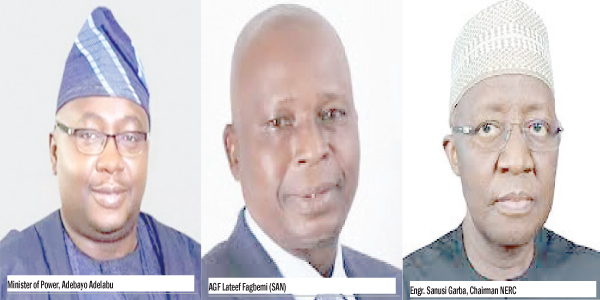As part of efforts to curb energy theft, many laws; Electricity Theft and Other Related Offences Regulations, the Electric Power Sector Reform Act (EPSRA) 2005, Miscellaneous Offences Act (MOA) and certain provisions in the Criminal Code and Penal Code were put in place, without much success. YEJIDE GBENGA-OGUNDARE considers the legislations, the increasing debt profile in the Nigerian Electricity Supply Industry (NESI) and ultimately, the impacts on the country’s economy.
Electricity is an important aspect of life as virtually all economic endeavours need power. As a result, the constant unavailability of this important part of daily life in Nigeria, affects a lot of things, both in homes and businesses, especially in the manufacturing sector. And while the constant lack of power is a major problem in the Nigerian society, some people also add to already terrible situation by using power illegally through illegal power connections; unauthorised tapping of electricity from power grid, often without the knowledge or approval of electricity providers, bypass of meter, tampering with meter reading, utilising electricity without paying for it and such acts which are classified as ‘power theft.’
In Nigeria today, the major challenge faced by Power Distribution Companies (DisCos) is electricity theft which has been identified as a major contributor to the power supply crisis in the country, an issue that has been a longstanding complication in the Nigerian Electricity Supply Industry (NESI). Already, the electricity being generated in the country is short of the needed capacity to power the whole country, and from the inadequate generation, some consumers still steal, without concern for the impacts of their illegal activities.
“They will say it is a victimless crime forgetting that they are stealing the revenue of the DisCos and adding to the problem of the country, because power theft, is a major source of revenue loss for distribution companies. This is one of the reasons the debt profile in the Nigerian Electricity Supply Industry is increasing drastically. “Yet this same set of people complain that they don’t have constant power. Electricity theft affects the entire value chain in the power sector and ultimately cripples the economy of individuals and the nation as a whole,” Tolu Obanimi, a marketer with a power distribution company told The Jury.
This was confirmed by a report given by the director of the power sector advocacy group in Nigeria which indicated that 11 electricity distribution companies lost approximately N97,000,000,000.00 (Ninety-seven Billion Naira) to electricity theft in the first three months of 2021. Also, the Association of Nigerian Electricity Distributors (ANED) in a report said over N30,000,000,000.00 (Thirty Billion Naira) of their monthly revenue is lost to cases of electricity theft, meter bypass, vandalism and unpaid electricity bills by consumers while NERC said over 25 percent of the total energy wheeled by the Transmission Company of Nigeria (TCN) to electricity Distribution Companies (Discos) is lost to theft and technical inefficiency.
And power theft is not without dangers; Buypower.ng in a report on energy theft, highlighted the dangers of illegal power connections to cover power outages, electrical accidents and fatalities, fire hazards and revenue losses and increased tariffs.
The organisation added that illegal electricity connections often involve unsafe and substandard materials, as well as inadequate installation and maintenance practices which leads to electrical accidents and fatalities and can also increase the risk of fire hazards, emphasising that overloaded circuits, substandard wires, and electrical sparks can all cause fires that can quickly spread and destroy property and injure or kill people in the process.
“Illegal electricity connections can overload the power grid and cause power outages, disrupting services and causing inconveniences for businesses and individuals. For example, in 2017, an illegal power connection caused a massive power outage in Dhaka, Bangladesh, affecting millions of people and disrupting transportation and communication systems. Illegal electricity connections result in significant revenue losses for electricity providers, leading to increased tariffs and prices for consumers. The Association of Nigerian Electricity Distributors (ANED) report showed that over ₦30,000,000,000 (thirty billion naira) of monthly revenue was lost to electricity theft, vandalism and meter bypass cases. This loss of revenue not only affects the financial viability of power companies but also hinders the ability of power companies to invest in infrastructure and equipment needed to improve power supply to electricity customers,” the organisation wrote in its report..
Are there laws?
There are many laws that criminalise power theft in Nigeria. In 2014, the Nigerian Electricity Regulation Commission (NERC) formulated the Electricity Theft and Other Related Offences Regulations in order to deter electricity theft and the destruction of electricity supply infrastructure. The NERC has made several regulations but the one which focuses primarily on regulations to deter theft of electricity and destruction of electricity supply infrastructure, with penalties, is 2014 Act mentioned above.
Section 1 (1) states that: “Any person who willfully and unlawfully taps, makes or causes to be made any connection with overhead, underground or under water lines or cables, or tampers with a meter, installs or uses a tampered meter, current reversing transformer, shorting or shunting wire, loop connection, receives electricity supply by by-passing a meter, or uses any other device or method which interferes with accurate or proper registration, calibration or metering of electric current or otherwise results in diversion in a manner whereby electricity is stolen or wasted; or damages or destroys an electric meter, apparatus, equipment, wire or conduit or causes or allows any of them to be so damaged or destroyed as to interfere with the proper or accurate metering of electricity, so as to abstract or consume electricity or knowingly use or receive the direct benefit of electric service shall be guilty of an offence under Sections 383 and 400 of the Criminal Code, Sections 286 (2) of the Penal Code and Section 1 of this Regulation, and shall be punishable with terms of imprisonment as applicable, provided under Sections 390 of the Criminal Code, Section 287 of the Penal Code or Section 94 of the EPSR Act.
Also, Section 94 (3) of the Electric Power Sector Reform Act (EPSRA also contains provisions prohibiting electricity theft in whatever manner as it provides that: “Notwithstanding anything contained in any other law, any person who willfully destroys, injures or removes equipment or apparatus of a licensee commits an offence and is liable on conviction to imprisonment for a period of not less than five years and not more than seven years”.
The Miscellaneous Offences Act (MOA) also made provisions dealing with tampering with electrical equipments. Section 1(9) of the MOA provides that “any person who unlawfully disconnects, removes, damages, tampers, meddles with or in any way whatsoever interferes with any plant, works, cables, wire or assembly of wires designed or used for transforming or converting electricity shall be guilty of an offense and liable on conviction to be sentenced to imprisonment for life.”
In Section 1(10), the MOA additionally provides that “any person who unlawfully disconnects, removes, damages, tampers, meddles with or in any way whatsoever interferes with any electric fittings, meters or other appliances used for generating, transforming, converting, conveyancing, supplying or selling electricity shall be guilty of an offence and liable on conviction to imprisonment for a term not exceeding 21 years.”
Also, Sections 383 and 400 of the Criminal Code, Sections 286 (2) of the Penal Code among others, cover the crime of power theft and provide punishment in terms of imprisonment as applicable, and provided for, under Sections 390 of the Criminal Code, Section 287 of the Penal Code or Section 94 of the EPSR Act.
The Lagos State Electric Power Sector Reforms Law also makes provisions for curbing electricity theft within the state.
The Law criminalises meter tampering and destruction of electricity infrastructure, and also established a Power Task Force which is vested with the power to arrest offenders, enter, inspect and search premises in which an authorised officer of the Power Task Force has reason to believe that electricity is being or likely to be used unlawfully.
In validating the power to search, by officers of the task force, the law stipulates that the provisions of Part II of the Administration of Criminal Justice (Repeal and Re-enactment) Law, shall apply with respect to searches and seizures under the law. Furthermore, for speedy dispensation of cases, the law vests jurisdiction to try the offences in Special Courts.
How to make laws work – lawyers
According to experts, if electricity theft is not controlled urgently, it will contribute immensely to a continued cycle of mountain debts and inefficiencies for not just the DISCOs but also for the GENCOs considering an estimated average loss of about N21 billion annually in the power sector to energy theft. Two legal practitioners, Uche Matthew and Jeremiah Aderinto from the S.P.A. Ajibade & Co, postulated ways to stop electricity theft in an article on implementation and enforcement of electricity theft legislations.
They said there is a need for the implementation and enforcement of the electricity theft-related legislations by regulatory agencies in order to prevent further loss, adding that “while the establishment of the Power Task Force under the Lagos State Electric Power Sector Reform Law is commendable, there is a need to emphasise the effective discharge of its responsibility in deterring consumers from stealing electricity.”
They emphasised that any further delays in the effective implementation and enforcement of electricity theft-related legislations will encourage continuous incessant behaviour by the theft agents, which will in effect, hamper DisCos businesses and their ability to meet performance targets as contained in Performance Agreements, ultimately, widening the sector’s liquidity gap.
“Furthermore, there is a need for collaborative engagement of the DisCos with relevant regulatory and enforcement agencies to tackle electricity theft in their respective distribution zones.
“There is a need to educate electricity consumers on the fundamentals of the electricity sector and the importance of fighting the crime of electricity theft. The notion conceived in the minds of average Nigerian consumers is that power is an entitlement and that DisCos are rivals, denying them of what is theirs.
“This notion ought to be erased and can only be done through intensive enlightenment programmes. This entitlement mentality is one of the major drivers of electricity theft in many parts of the country,” they added.
In addition, they called for designation of special courts to handle electricity-related offences as judicial intervention through speedy and efficient justice dispensation.
A social commentator, Lewis Amana said, “the importance of the eradication of electricity theft cannot be over-emphasised especially when the adverse effect on the DisCos is considered, it is therefore the collective responsibility of all stakeholders to undertake an aggressive campaign on the hazards and impact of electricity theft in the country because when we curb electricity theft, it will go a long way towards efficient use and distribution of power and energy audit, leading to improved financial status and viability of the power sector as well as its value chain.
There is a consensus that illegal electricity connections are not only illegal but also pose significant dangers to individuals, communities and the economy as a whole and it is important for individuals and communities to report any illegal connections to electricity providers and promote safe and legal electricity practices for a safer society.
READ ALSO: Police arrest man, wife for producing fake wines in Lagos
WATCH TOP VIDEOS FROM NIGERIAN TRIBUNE TV
- Let’s Talk About SELF-AWARENESS
- Is Your Confidence Mistaken for Pride? Let’s talk about it
- Is Etiquette About Perfection…Or Just Not Being Rude?
- Top Psychologist Reveal 3 Signs You’re Struggling With Imposter Syndrome
- Do You Pick Up Work-Related Calls at Midnight or Never? Let’s Talk About Boundaries







